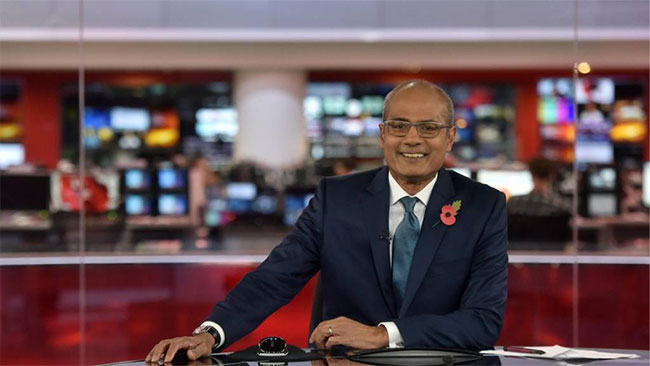BBC newsreader George Alagiah has died at the age of 67, British media reported on Monday.
The Sri Lanka-born journalist – the face of BBC One’s News At Six since 2007 – was diagnosed in 2014 with stage four bowel cancer, which had spread to his liver and lymph nodes.
He endured two rounds of chemotherapy and several operations, including the removal of most of his liver.
In October 2015 he announced his treatment was over and returned to BBC News At Six on 10 November.
Alagiah joined the BBC in 1989 and spent many years as one of the corporation’s leading foreign correspondents before moving to presenting.
In a statement, his agent Mary Greenham said: “I am so terribly sorry to inform you that George Alagiah died peacefully today, surrounded by his family and loved ones.
“George fought until the bitter end but sadly that battle ended earlier today.
“George was deeply loved by everybody who knew him, whether it was a friend, a colleague or a member of the public. He simply was a wonderful human being.
“My thoughts are with Fran, the boys and his wider family.”
BBC director-general Tim Davie said: “George was one of the best and bravest journalists of his generation who reported fearlessly from across the world as well as presenting the news flawlessly.
“He was more than just an outstanding journalist, audiences could sense his kindness, empathy and wonderful humanity. He was loved by all and we will miss him enormously.”
Labour leader Sir Keir Starmer tweeted: “Deeply saddened by the news of George Alagiah’s passing.
“A much-loved face of BBC News for decades, George will also be remembered for his brilliant, fearless journalism as foreign correspondent. He rightly won awards for his evocative, boundary-pushing reporting.
“British journalism has lost a talent. My thoughts are with his family and loved ones.”
Alagiah first began hosting the 6pm news bulletin in early 2003, but stepped up to front it solo four years later following the departure of his co-host, Natasha Kaplinsky.
He was previously a prominent foreign correspondent, often as a specialist in Africa with coverage of civil wars in Somalia and Liberia, as well as the genocide in Rwanda 20 years ago.
Throughout his career, he interviewed central political figures, among them former South African president Nelson Mandela, Archbishop Desmond Tutu, and ex-Zimbabwean leader Robert Mugabe.
Before joining the BBC, Alagiah worked as a print journalist and went on to write a number of books including A Home From Home, which looked at what it means to be British.
Throughout his illustrious career, he also presented other shows such as Mixed Britannia, looking at the UK’s mixed-race population.
He was made an OBE in the 2008 New Year Honours.
Alagiah was born in the Sri Lankan capital of Colombo in 1955 to Tamil and Christian parents. The family relocated to Ghana when Alagiah was six to escape anti-Tamil violence in Sri Lanka.
During the BBC’s coverage of the 2004 Asian tsunami, he returned to the country to find that his grandfather’s former home had been destroyed in the natural disaster.
The journalist spent part his of childhood in Ghana in west Africa where he moved with his engineer father Donald and mother Therese.
The family moved to England when Alagiah turned 11.
It was the landmark Watergate investigation which inspired Alagiah, aged 17, to start a career in media.
Before starting with the BBC in 1989, Alagiah was based in Johannesburg as developing world correspondent for South Magazine.
He was named Amnesty International’s journalist of the year in 1994 for reporting on the civil war in Burundi and also won the Broadcasting Press Guild’s award for television journalist of the year.
He was also part of the BBC team that won a Bafta Award in 2000 for its reporting of the conflict in Kosovo, one of several prizes he received during his broadcasting career.
After first presenting BBC Four News in 2002 he went on to co-anchor the corporations 6pm news bulletin, first alongside Sophie Raworth and then Natasha Kaplinsky.
From 2007 he was the programmes sole presenter while he was also a relief presenter for News at Ten.
He interviewed several world leaders including Nelson Mandela, Robert Mugabe and former UN Secretary-General Kofi Annan.
In 2008, he was made an OBE in the New Year Honours list for services to journalism.
Away from journalism, Alagiah was a published author and his debut novel was shortlisted for a Society Of Authors award.
His thriller The Burning Land, about corruption and homicide in South Africa, was in the running for the Paul Torday memorial prize, which is awarded to a first novel by a writer over 60.
Source: Sky News/Daily Mail


